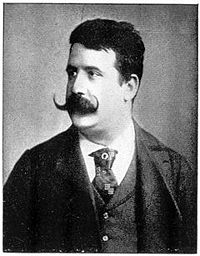Ruggiero Leoncavallo
Ruggiero Leoncavallo (April 23, 1857- August 9, 1919) was an Italian opera composer and librettist of great renown. As a representative of the verismo movement in Italian opera, Leoncavallo brought a realism onto the operatic stage with his intense verbal texts and rich harmonic music. Leoncavallo's attention to the details of every-day life was his way of bringing an understanding of human responsibility to the forefront so that his audience would take responsibility for their lives and the lives of others. To Leoncavallo, each individual should be accountable for their own personal and spiritual transformation and to give to the well-being of others. He exemplified these values in his music.
Biography
The son of a judge, Leoncavallo was educated at the Conservatorio San Pietro a Majella in his native city, Naples (the date 1858, given for his birth in older histories of music, is incorrect). After some years spent teaching and in ineffective attempts to obtain the production of more than one opera, he saw the enormous success of Mascagni's Cavalleria Rusticana in 1890, and he wasted no time in producing his own verismo hit, Pagliacci. (According to Leoncavallo, the plot of this work had a real-life origin: he claimed it derived from a murder trial at which the composer's father had presided.)
Pagliacci was performed in Milan in 1892 with immediate success; today it is the only work by Leoncavallo in the standard operatic repertory. Its most famous aria Vesti la giubba ("Put on the trappings" or, in the better-known older translation, "On with the motley") was recorded by Enrico Caruso and became the world's first record to sell a million copies.
The next year his I Medici was also produced in Milan, but neither it nor Chatterton (1896)—both early works—obtained any favor, and it was not until La Bohème was performed in 1897 in Venice that his talent obtained public confirmation. (Its two tenor arias are still occasionally performed, especially in Italy, yet it was outshone by Puccini's opera of the same name and on the same subject (albeit a better libretto), which was premiered in 1896.) Subsequent operas by Leoncavallo were Zazà (1900) (the opera of Geraldine Farrar's famous farewell performance at the Met), and Der Roland (1904). Nothing from the latter opera is heard today, but the baritone aria from Zazà is still sometimes sung.
Leoncavallo also wrote songs, most famously Mattinata. He died in Montecatini, Tuscany, in 1919.
Legacy
Leoncavallo was the librettist for all of his own operas. Many considered him the greatest Italian librettist of his time after Boito. Among Leoncavallo's librettos for other composers is his contribution to the libretto for Puccini's Manon Lescaut. Leoncavallo was also known as a key contributor to the verismo movement in Italian opera.
Operas
- Pagliacci (May 21, 1892 Teatro Dal Verme, Milan)
- I Medici (November 9, 1893 Teatro Dal Verme, Milan) [first part of the trilogy Crepusculum - not completed]
- Chatterton (March 10, 1896 Teatro Argentina, Rome) [rev. of a work written in 1876 ]
- La Bohème (May 6, 1897 Teatro La Fenice, Venice)
- Zazà (November 10, 1900 Teatro Lirico, Milan)
- Der Roland von Berlin (December 13, 1904 Deutsche Oper, Berlin)
- Maia (January 15, 1910 Teatro Costanzi, Rome)
- Gli Zingari (September 16, 1912 Hippodrome, London)
- Mimi Pinson (1913 Teatro Massimo, Palermo) [rev. of La Bohème]
- Edipo Re (December 13, 1920 Opera Theatre, Chicago)
Operettas
- La jeunesse de Figaro (1906, USA)
- Malbrouck (January 19, 1910 Teatro Nazionale, Rome)
- La reginetta delle rose (June 24, 1912 Teatro Costanzi, Rome)
- Are You There? (November 1, 1913 Theatre Prince of Wales, London)
- La candidata (February 6, 1915 Teatro Nazionale, Rome)
- Prestami tua moglie (September 2, 1916 Casino delle Terme, Montecatini)
- Goffredo Mameli (April 27, 1916 Teatro Carlo Felice, Genoa)
- A chi la giarrettiera? (October 16, 1919 Teatro Adriano, Rome)
- Il primo bacio (April 29, 1923 Salone di cura, Montecatini)
- La maschera nuda (June 26, 1925 Teatro Politeama, Naples)
ReferencesISBN links support NWE through referral fees
- Dryden, Konrad Claude. Leoncavallo: life and works. Lanham, MD: Scarecrow Press, 2007. ISBN 0810858800
- Kobbe, Gustav, George Henry Hubert Lascelles Earl of Harewood. The definitive Kobbe's opera book. NY: Putnam, 1987. ISBN 0399131809
- Smillie, Thomson, David Timson, and Ruggiero Leoncavallo. An introduction to—Leoncavallo, Pagliacci. Naxos Music Lib., 2006. ISBN 1843790688
Credits
New World Encyclopedia writers and editors rewrote and completed the Wikipedia article in accordance with New World Encyclopedia standards. This article abides by terms of the Creative Commons CC-by-sa 3.0 License (CC-by-sa), which may be used and disseminated with proper attribution. Credit is due under the terms of this license that can reference both the New World Encyclopedia contributors and the selfless volunteer contributors of the Wikimedia Foundation. To cite this article click here for a list of acceptable citing formats.The history of earlier contributions by wikipedians is accessible to researchers here:
The history of this article since it was imported to New World Encyclopedia:
Note: Some restrictions may apply to use of individual images which are separately licensed.
